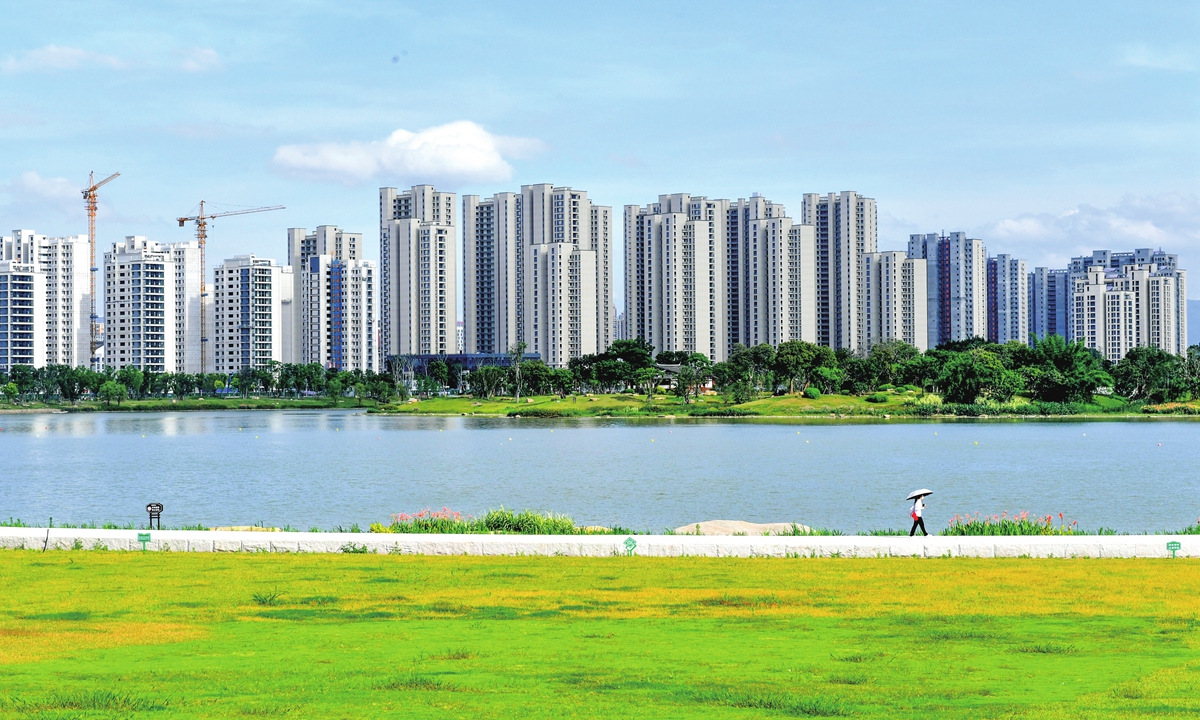
A new residential complex in Fuzhou, East China's Fujian Province Photo:cnsphoto
Foreign investors, ranging from Goldman Sachs to BlackRock are quietly snapping up Chinese real estate assets over the recent months, rushing into the world's second-largest economy "against the trend," although some foreign media outlets continue hyping the risks and even a possible "collapse" of China's property market.
The inflow indicates a change of prospect for the country's real estate market, observers said, adding that "smart money" represented by foreign capital has already sensed the opportunity given it is currently a buyer's market.
The most recent move was made by Goldman Sachs, who has launched a joint venture in China with Shanghai-headquartered logistics company Sunjade in a bid to boost investment in Chinese logistics and infrastructure real estate assets, the US bank said on October 24.
The joint venture, which focuses on projects located in China's first-tier cities and surrounding areas, has invested in a 240,000-square-meter project with four institutional-grade warehouse assets located in Shanghai and neighboring areas.
The US bank said the new platform will benefit from China's rising demand for new high-quality infrastructure assets, in particular institutional-quality warehousing space driven by e-commerce and the diversification of industrial requirements supported by government policies.
Private equity investor Blackstone has raised over $7.8 billion for the third installment of its Asian opportunistic real estate fund series in late September, with investments expected to make in countries and regions including China.
According to the China Index Academy, an independent real estate research institution, foreign-funded enterprises such as BlackRock, Daiwa House Group, e-Shang Redwood and CapitaLand have all accelerated their expansion into domestic real estate market as of September.
Meanwhile, foreign capital represented by BlackRock and Goldman Sachs is also actively buying bonds or stocks of Chinese real estate companies.
'Fundamental change'These signs reflect a "fundamental change" of market expectations for China's real -estate industry, Wang Yanhang, a senior fellow from the Chongyang Institute for Financial Studies at the Renmin University of China, told the Global Times on Wednesday.
At present, the valuation of domestic real estate industry is at a low level due to a transition period, therefore, foreign capital is seizing the opportunity to accelerate its entry into the promising industry, Wang said.
Recent data showed that the pace of housing sales decline slows in September, bringing recovery hopes. During the first nine months in 2022, sales of
commercial housing fell 26.3 percent - better than the 27.9 percent in January-August period - year-on-year to 9.94 trillion yuan ($1.37 trillion), according to data from the National Bureau of Statistics (NBS) on October 24.
Sales hit the bottom during the period from January to May, falling 31.5 percent year-on-year. The pace of decline eased to 28.9 percent during the January-June period.
Following the continuous optimization of policies from the central government, the appropriate addressing of risks in some real estate enterprises, and the continuous recovery of the market, domestic property market is expected to gradually bottom out and confidence will stabilize, Wang said.
The strategic transformation of China's real estate giants has also provided market space for foreign investment, Chen Jia, an independent research fellow on international strategy, told the Global Times on Wednesday.
For instance, Chinese enterprises represented by Wanda and Country Garden have launched the "asset-light" strategy, which offered room for foreign counterparts to participate in and optimize some "heavy asset" projects, Chen explained.
A 'supplement'Taking a closer look at the projects acquired by foreign investors, it can be found that foreign investors prefer projects like office buildings, long-term rental apartments in first- and second-tier cities, to logistics parks and old-city renovations - the areas where they are "good at" and could bring stable cash inflows.
On October 17, the China unit of Singaporean real estate group CapitaLand acquired Borui Plaza in downtown Beijing for 2 billion yuan at a 30 percent discount.
Built in 2012, Borui Plaza is located near Tuanjiehu subway station on Beijing's East Third Ring Road and has an area of about 58,200 square meters. The property's owner was a real estate developer in Dalian whose assets were seized by a court following the firm's debt default.
The current layout of foreign capital is a useful supplement to the mainland real estate market. In particular, foreign capital with rich experience in the operation of large assets can bring certain efficiency improvements, and the domestic real- estate market will also be better diversified with their participation, Bai Wenxi, chief economist at IPG China, told the Global Times on Wednesday.
They rarely participate in residential projects, mainly due to the fact that foreign capital itself is mostly insurance funds that pursue long-term stable income, while residential projects are development-type properties and cannot provide sustainable cash flow after the sale, Bai said.
Bai expected that private Chinese housing enterprises, state-owned enterprises and, overseas and Hong Kong-funded enterprises will stage a three-pronged press into China's real-estate market in the future, injecting fresh vitality and innovation ability into the industry.
With China's continuous push of its reform and opening-up efforts, continued economic stimulus, and an improving business environment, overseas investors' confidence in investing in China will be further boosted, Chen said, noting it is a rational and wise choice to increase investment in China including the real estate sector.




